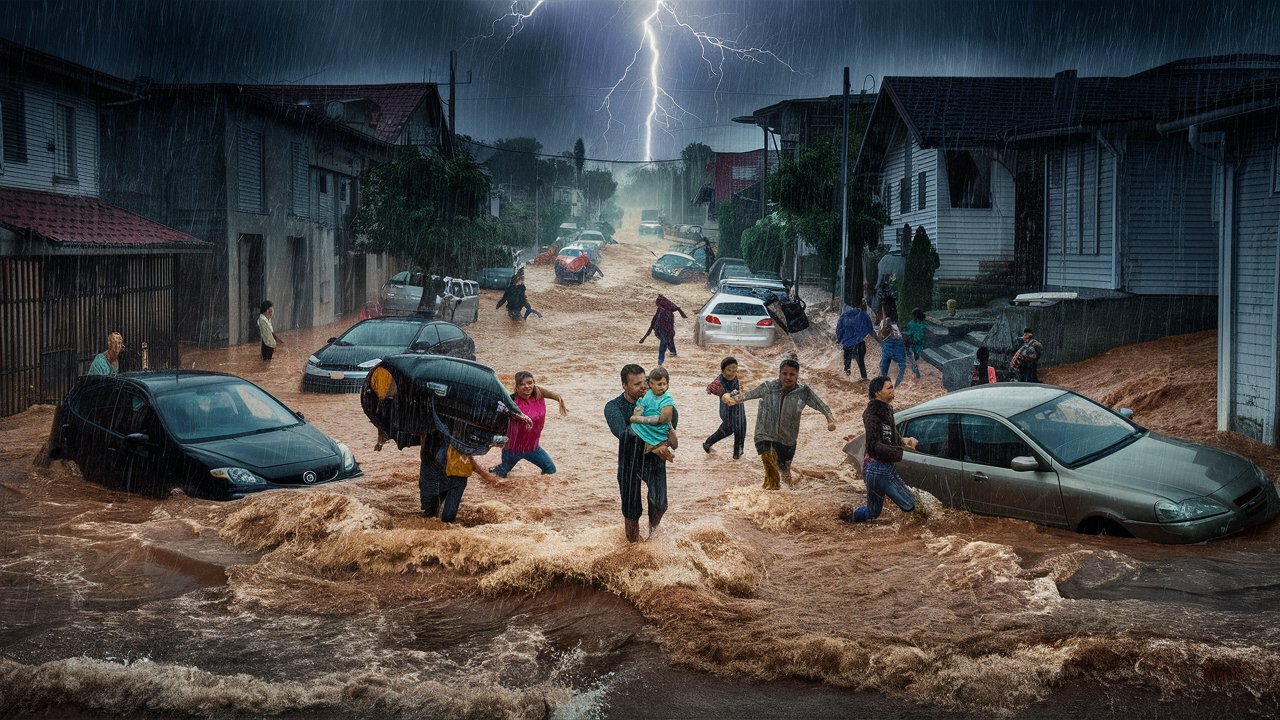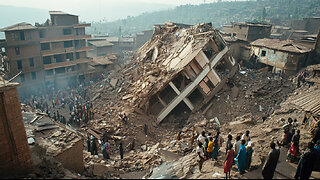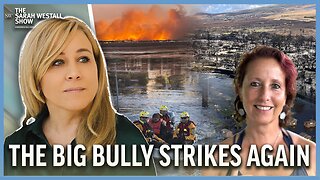Premium Only Content

The USA, Chile, India, Ecuador, Russia, Mexico, and Saudi Arabia In Chaos NOW!
🔻 Unprecedented Rainfall in Chile
For several days starting June 11, heavy rains, strong winds, and thunderstorms battered the central and southern parts of Chile. Seven out of the country’s 16 regions have been declared disaster zones. As a result of the natural disaster, one person died, three were injured, and over 11,000 people were affected. In just a few hours, around 350 mm of rain fell, exceeding the total rainfall the region received last year. The Chilean Meteorological Office issued the highest level of warning due to the heavy rains and winds. In the capital city of Santiago, this level of alert was announced for the first time in 20 years.
🔻 Massive Flooding in India
Tragic events occurred in the Indian state of Sikkim. Intense monsoon rains continued unabated for several days. In the Mangan district in northern Sikkim, 333 mm of rainfall was recorded from June 1 to June 14, with 240 mm falling in just 48 hours. Floodwaters from the Teesta River washed away roads and bridges, causing significant damage and disrupting transportation. Nearly 100 homes were destroyed, and agricultural lands and pastures were flooded. As a result of the flooding and landslides, at least 6 people lost their lives. 2,400 tourists were stranded in various parts of Sikkim.
🔻 Deadly Flooding in Ecuador
On June 16, Ecuador was at the epicenter of powerful storms. More than 1,200 people were affected by the disaster, which claimed the lives of at least 10 people and injured many others. Across the country, rivers overflowed, mudflows and floods hit roads and bridges, cutting off the main highway connecting the highlands of Ecuador with the Amazon provinces. Thirteen provinces were affected by the heavy rains. In the city of Baños, Tungurahua Province, people, homes, and vehicles were buried under a massive landslide.
🔻 Uncontrollable Wildfires in the USA
On June 15, a forest fire broke out in Los Angeles County. Due to windy weather and low humidity, the flames spread very quickly, engulfing more than 6,000 hectares of land in both Los Angeles County and neighboring Ventura. The fire approached residential and tourist areas, resulting in the evacuation of 1,200 people. By June 17, only 2% of the fire's area was under control. Two large fires broke out on June 17 in southeastern New Mexico. The fire behavior was extreme, with flames reaching heights of 30 meters, and strong winds making it impossible to stop the spread. Within an hour, police and fire departments had barricaded all roads in the affected communities. The only route for emergency evacuation was from Sadderth to Highway 70, leading to Roswell. People were told: "Leave NOW: do not attempt to gather belongings or defend your home. Evacuate immediately."
🔻 Scorching Heat in Saudi Arabia
A wave of abnormal heat hit Saudi Arabia. On June 17, the air in Mecca reached a scorching temperature of 125.24°F. For several days prior, unbearable heat had persisted, with nighttime temperatures rarely dropping below 104°F. The extreme heat coincided with the Hajj, the annual Muslim pilgrimage to Mecca, which this year took place from June 14 to 19. People were collapsing in the streets due to the unbearable heat. On Sunday alone, more than 2,700 people suffered heatstroke and were taken to local hospitals. Eyewitnesses reported seeing motionless bodies lying on the sides of the roads. According to official statements and reports from diplomats from several countries, such as Egypt, Indonesia, India, Malaysia, and others, the death toll had reached 1,126 by June 21.
🔻 Tropical Storm Alberto
Alberto, the first tropical storm of the Atlantic hurricane season, struck the coast of Mexico on June 19. Torrential rains caused by the tropical depression into which Storm Alberto had transformed, poured inland, causing damage to the neighboring states of Nuevo León and Veracruz. Four fatalities were reported due to the disaster. A section of the main highway connecting Monterrey and Saltillo was washed out. In Monterrey, public transportation, including the metro, was almost halted for a day. The storm also brought heavy rains to southern Texas, USA. In Rockport, Texas, 160 mm of rain fell, while the average for June is 60 mm. Alberto also triggered a storm surge in Texas and western Louisiana, reaching up to 6 feet in some low-lying areas around Houston and Galveston, Texas.
The climate crisis is intensifying, disrupting our way of life and making more areas uninhabitable. Many ignore these changes, putting all humanity at risk. Indifference and inaction will lead to catastrophic consequences. The issue of increasing natural disasters must become a priority for the entire world. This issue needs to be raised on all platforms so that politicians and scientists start taking action. Learn more at the "Global Crisis. The Responsibility" forum. The future of humanity is in your hands.
https://creativesociety.com/videos/global-crisis-the-responsibility-international-online-forum-edited-version
-
 8:49
8:49
AllatRa TV
1 day agoEthiopia NOW! Volcano Threat: Earthquakes and Magma Intrusion Raise Alarm
772 -
 LIVE
LIVE
The Jimmy Dore Show
1 hour agoTrump TROLLS Newsom Over LA Fires! Zuckerberg & Facebook GIVE UP on Fact Checking!
9,380 watching -
 LIVE
LIVE
Dr Disrespect
8 hours ago🔴LIVE - DR DISRESPECT - DELTA FORCE - ATTACK AND EXTRACT
3,110 watching -
 1:15:19
1:15:19
Dr. Drew
5 hours agoMy Pasadena Home Is Surrounded By CA Wildfires w/ OC Fire Chief Brian Fennessy & LA's John Phillips – Ask Dr. Drew
15.4K8 -
 LIVE
LIVE
Melonie Mac
2 hours agoGo Boom Live Ep 33!
258 watching -
 LIVE
LIVE
2 MIKES LIVE
5 hours ago2 MIKES LIVE #164 with Special Guests SARAH WESTALL and ALEC LACE!
403 watching -
 49:16
49:16
Sarah Westall
2 hours agoComparisons: Maui Fire and North Carolina Hurricane – Land & Resource Grabs w/ Michelle Melendez
5.46K8 -
 1:00
1:00
Congresswoman Harriet Hageman
5 hours agoCongresswoman Harriet Hageman Rumble Rollout
19.1K35 -
 3:13:02
3:13:02
Scammer Payback
4 hours agoCalling Scammers Live
28.8K3 -
 13:08
13:08
RealitySurvival
9 hours agoNorth American Union - Why THIS IS A BAD Idea!
11.9K9